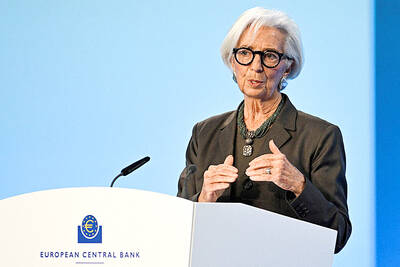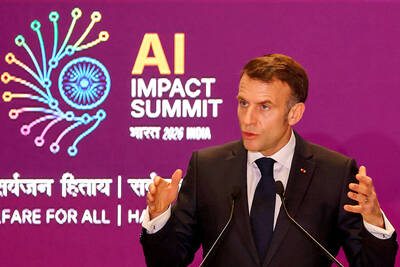Asian stocks on Friday followed Wall Street lower as fears spread that US interest rate hikes to fight inflation might stall economic growth.
Investors are worried whether the US Federal Reserve, which raised its key interest rate by half a percentage point on Wednesday, can cool inflation without tipping the US economy into recession. Traders were briefly encouraged by Fed chairman Jerome Powell’s comment that the Fed was not considering even bigger increases.
“Clearly, investors had second thoughts about the so-called ‘dovish hike’ from the Fed,” Rob Carnell, head of Asia-Pacific research at ING, wrote in a report.
The likelihood is “rate hikes coming thick and fast, but little if any prospect of a turn in inflation any time soon,” he wrote.
In Taiwan, the TAIEX dropped 287.92 points, or 1.72 percent, to 16,408.20. The index lost 1.11 percent over the week to post its second straight week of declines.
Hong Kong’s Hang Seng plunged 3.81 percent to 20,001.96, down 5.16 percent on the week, while the Shanghai Composite Index fell 2.16 percent to 3,001.56, declining 1.49 percent weekly.
In Seoul, the KOSPI tumbled 1.23 percent to 2,644.51 and lost 0.86 percent on the week.
Sydney’s S&P/ASX 200 lurched down 2.16 percent to 7,205.6, dropping 3.09 percent from a week earlier, while India’s SENSEX closed down 1.56 percent at 54,835.58, posting a weekly decline of 3.90 percent.
Japan bucked the trend as trading resumed after a holiday, with the Nikkei 225 increasing 0.69 percent to 27,003.56, up 1.14 from a week earlier, and the broader TOPIX rising 0.93 percent to 1,915.91 — a weekly gain of 1.99 percent.
Additional reporting by staff writer, with CNA

European Central Bank (ECB) President Christine Lagarde is expected to step down from her role before her eight-year term ends in October next year, the Financial Times reported. Lagarde wants to leave before the French presidential election in April next year, which would allow French President Emmanuel Macron and German Chancellor Friedrich Merz to find her replacement together, the report said, citing an unidentified person familiar with her thoughts on the matter. It is not clear yet when she might exit, the report said. “President Lagarde is totally focused on her mission and has not taken any decision regarding the end of

French President Emmanuel Macron told a global artificial intelligence (AI) summit in India yesterday he was determined to ensure safe oversight of the fast-evolving technology. The EU has led the way for global regulation with its Artificial Intelligence Act, which was adopted in 2024 and is coming into force in phases. “We are determined to continue to shape the rules of the game... with our allies such as India,” Macron said in New Delhi. “Europe is not blindly focused on regulation — Europe is a space for innovation and investment, but it is a safe space.” The AI Impact Summit is the fourth

CONFUSION: Taiwan, Japan and other big exporters are cautiously monitoring the situation, while analysts said more Trump responses ate likely after his loss in court US trading partners in Asia started weighing fresh uncertainties yesterday after President Donald Trump vowed to impose a new tariff on imports, hours after the Supreme Court struck down many of the sweeping levies he used to launch a global trade war. The court’s ruling invalidated a number of tariffs that the Trump administration had imposed on Asian export powerhouses from China and South Korea to Japan and Taiwan, the world’s largest chip maker and a key player in tech supply chains. Within hours, Trump said he would impose a new 10 percent duty on US imports from all countries starting on

STRATEGIC ALLIANCE: The initiative is aimed at protecting semiconductor supply chain resilience to reduce dependence on China-dominated manufacturing hubs India yesterday joined a US-led initiative to strengthen technology cooperation among strategic allies in a move that underscores the nations’ warming ties after a brief strain over New Delhi’s unabated purchase of discounted Russian oil. The decision aligns India closely with Washington’s efforts to build secure supply chains for semiconductors, advanced manufacturing and critical technologies at a time when geopolitical competition with China is intensifying. It also signals a reset in relations following friction over energy trade and tariffs. Nations that have joined the Pax Silica framework include Japan, South Korea, the UK and Israel. “Pax Silica will be a group of nations